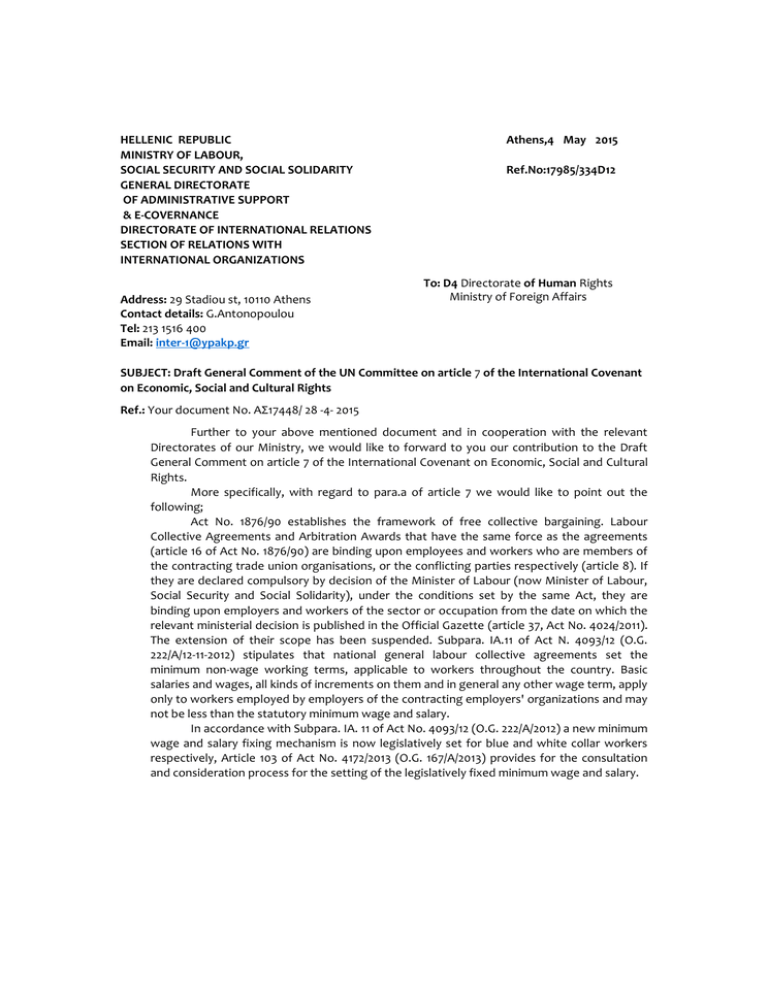
HELLENIC REPUBLIC
MINISTRY OF LABOUR,
SOCIAL SECURITY AND SOCIAL SOLIDARITY
GENERAL DIRECTORATE
OF ADMINISTRATIVE SUPPORT
& E-COVERNANCE
DIRECTORATE OF INTERNATIONAL RELATIONS
SECTION OF RELATIONS WITH
INTERNATIONAL ORGANIZATIONS
Address: 29 Stadiou st, 10110 Athens
Contact details: G.Antonopoulou
Tel: 213 1516 400
Email: inter-1@ypakp.gr
Athens,4 May 2015
Ref.No:17985/334D12
To: D4 Directorate of Human Rights
Ministry of Foreign Affairs
SUBJECT: Draft General Comment of the UN Committee on article 7 of the International Covenant
on Economic, Social and Cultural Rights
Ref.: Your document No. AΣ17448/ 28 -4- 2015
Further to your above mentioned document and in cooperation with the relevant
Directorates of our Ministry, we would like to forward to you our contribution to the Draft
General Comment on article 7 of the International Covenant on Economic, Social and Cultural
Rights.
More specifically, with regard to para.a of article 7 we would like to point out the
following;
Act No. 1876/90 establishes the framework of free collective bargaining. Labour
Collective Agreements and Arbitration Awards that have the same force as the agreements
(article 16 of Act No. 1876/90) are binding upon employees and workers who are members of
the contracting trade union organisations, or the conflicting parties respectively (article 8). If
they are declared compulsory by decision of the Minister of Labour (now Minister of Labour,
Social Security and Social Solidarity), under the conditions set by the same Act, they are
binding upon employers and workers of the sector or occupation from the date on which the
relevant ministerial decision is published in the Official Gazette (article 37, Act No. 4024/2011).
The extension of their scope has been suspended. Subpara. IA.11 of Act N. 4093/12 (O.G.
222/A/12-11-2012) stipulates that national general labour collective agreements set the
minimum non-wage working terms, applicable to workers throughout the country. Basic
salaries and wages, all kinds of increments on them and in general any other wage term, apply
only to workers employed by employers of the contracting employers' organizations and may
not be less than the statutory minimum wage and salary.
In accordance with Subpara. IA. 11 of Act No. 4093/12 (O.G. 222/A/2012) a new minimum
wage and salary fixing mechanism is now legislatively set for blue and white collar workers
respectively, Article 103 of Act No. 4172/2013 (O.G. 167/A/2013) provides for the consultation
and consideration process for the setting of the legislatively fixed minimum wage and salary.
Moreover, subpara. ΙΑ. 7 of Act N, 4254/2014 (85/A/7-4-2014) stipulated a smaller
increment depending on the years of service for the long-term unemployed, as an emergency
support measure in order to facilitate their entrance into the labour market.
Act No. 1876/1990 has been amended with regard to the capacity of the interested trade
union organizations to conclude collective agreements and arbitration awards by virtue of article
37 of Act No. 4024/2011 (0,G. 226/A/2011) and article 4 of Act No. 4303/2014 (231/A/2014),
determining procedural issues relating to mediation and arbitration of collective disputes.
Bargaining between employers’ and workers' trade union organisations are free, however, the pay
terms that will result may not be less than the statutory minimum wage and salary, while the
working terms may not be less favourable than those stipulated in subpara. IA.11 of Act N. 4093/12.
The contracting parties may agree on more favourable terms both regarding pay, as well as
regarding leaves, working hours, facilities and provisions, provided that they are not contrary to
mandatory provisions.
Act N. 1876/90 (O.G. 27/A/1990) applies to all workers bound by a dependent working
relationship under private law employed with any national or foreign employer, enterprise,
undertaking or service of the private or public sector of the economy, including those who are
employed In agriculture, livestock breeding and relevant works as well as domestic workers. It also
applies to natural persons who although are not bound by a dependent working relationship they
perform their work in a situation of dependence and require protection similar to that enjoyed by
employed workers (article 1). The last National General Labour Collective Agreement (NGLCA) is the
NGLCA dated 26-3-2014, which came into force on 1-1-2014 and expired on 31-12-2014 and was
extended for one more semester (article 40, Act N. 4320/15, O.G. 29/A/19-3-2015). In this NGLCA, the
provision of the 1984 NGLCA (MD 11770- O.G. 81/B/20-2-2-1984) remained in force, according to
which «the duration of the working week for workers throughout the country employed by any
employer and bound by a working relationship under private law is set at 40 hours». Based on the
above, the 40-hour working week is in force.
Regarding live-in domestic workers, due to the specific nature of and the special
circumstances under which they provide their services (within the employer’s home environment
under a relationship of trust and special care for the employee - article 663 of the Civil Code), the
special provisions regarding working time limits for employees, work on Sundays, holidays, night,
days off, overtime and statutory overtime exceeding maximum working hours as well as
provisions regarding traveling away from the workplace do not apply. However, provisions
regarding paid leave also apply to domestic workers, following the extension of provisions of
Compulsory Act No. 539/1945 also to live-in domestic workers by virtue of Royal Decree No. 376/1971
and article 8, para. 2 of the NGLCA dated 26-2-1975. Moreover, all workers in addition to their
leave are entitled to holiday pay and holiday allowance (article 3, para. 16 of Act N. 4504/1966 (A'
57). It has to be noted that the right to holiday allowance results from the right to annual leave.
They are also entitled to Christmas and Easter bonuses, in accordance with article 1 of Act
No. 1082/1980 and article 4, para. 9 of JMD 19040/1981 (B'742), as well as compensation for
termination of their employment contract, in accordance with article 43 of Act N. 1836/1989.
Individual employment contracts and labour collective agreements of all kinds may not fix regular
monthly salaries and wages for full time employment at levels below the statutory minimum wage
and salary.
Regarding equal pay between men and women, at national level, the principle of equal pay
for work of equal value is established in para. 2 of article 4 of the Constitution that stipulates the
following: «Greek men and women have equal rights and equal
obligations». Moreover, para. 1, article 21 of the Constitution stipulates that «Work constitutes a
right and shall enjoy the protection of the State, which shall seek to create conditions of
employment for all citizens and shall pursue the moral and material advancement of the rural and
urban working population. All workers, irrespective of sex or other distinction, shall be entitled to
equal pay for work of equal value».
With regard to discrimination on the grounds of sex, in our country there is a new institutional
framework on the application of the principle of equal treatment between men and women in
employment and occupation where the issue of equal pay between men and women is explicitly
included and specifies the requirements of the Constitution mentioned above.
More specifically, by virtue or Act No. 3896/2010, our national legislation has been
harmonized with the provisions of Directive 2006/54/EC. The scope of the Act is extended so as to
apply to all workers in general. In particular, according with article 17 of the same Act, its provisions
apply to persons who are employed or are candidates for employment in the Public and the
broader public sector as well as in the private sector, under any working relationship or form of
employment, including works contract and on salaried assignment basis, irrespective of the nature
of services provided, to individuals exercising freelance professions and to individuals who receive
vocational training or are candidates for vocational training of any kind and form. More specifically,
article 2 of the above Act includes, inter alia, the definitions of direct and indirect discrimination and
pay.
Regarding para.b of article 7, we would like to underline that the current institutional
framework for the protection of workers’ health and safety, in full compliance with the relevant
community law, applies to all enterprises, establishments, undertakings and works of the private
and public sector (as well as Public Bodies Corporate and Local Self-Government Agencies) and to
all workers under any working relationship (indefinite period of time, temporary, part-time,
apprenticeship, undeclared, etc). However, as specified in the relevant community law, the entire
network of protective provisions does not cover the self-employed while domestic personnel is
explicitly exclude. Yet, even for these cases, the State has the obligation to ensure, to the extent
possible, the health and safety of employed persons.
At this point it has to be noted that our country has not ratified ILC 155 (1981), referred to in
the text and in particular para.29 regarding categories of workers who (should be) are covered by
the protective regulations on occupational health and safety.
Moreover, regarding para, c of article 7 we would like to mention the following:
The implementation of the principle of equal treatment irrespective of racial or ethnic
origin, religion or other belief, disability, age or sexual orientation, has been established by virtue of
Act No. 3304/2005 (16 A') and transposed into our National Law the two Directives of the European
Communities No. 2000/43/EC «implementing the principle of equal treatment irrespective of racial
or ethnic origin», and No. 2000/78/EC «on the equal treatment of persons irrespective of religion or
other belief, disability, age or sexual orientation, in employment and occupation ». In accordance
with the provisions of the above Act, the direct or indirect discrimination of persons is prohibited in
the public and private sector, on the grounds of racial or ethnic origin, inter alia, in employment and
occupation and also on the grounds of religion or other belief, disability, age or sexual orientation,
exclusively in employment and occupation.
In particular, the prohibition of discrimination on the grounds of racial or ethnic origin, as
stipulated in article 4, chapter II of Act N0.3304/05 applies in relation to: a) conditions for access to
employment and to occupation, including selection criteria and recruitment conditions and
promotion, b) access to all types and to all levels of vocational guidance, vocational training,
advanced vocational training and retraining, including practical work experience, c) employment
and working conditions, including dismissals and pay, d) membership of and involvement in an
organisation of workers or employers, or any organisation whose members carry on 9 particular
profession, including the benefits provided for by such organisations, e) social protection, including
social security and healthcare, f) social provisions, g) education and h) access to and supply of
goods and services which are available to the public, including housing.
In order to promote equality in advancement and reconciliation of professional and family
life, a special action is implemented in our country for the new programming period 2014-2020,
funded by the NSRF, in particular by the program entitled «Reconciling professional and family life
2014-2015». in this year’s round 2014-2015, 74.900 children in total have been accepted in care
facilities and 62.200 persons In total have benefited. This action aims at increasing employment and
equal involvement of the beneficiaries in employment by providing them posts for their children in
childcare facilities, thus, significantly facilitating parents - especially women who are
disproportionately affected by unemployment - to balance their demanding roles in family and
professional life.
With regard to the labour and social security rights of third country nationals in our country,
these are guaranteed by virtue of the provisions of Act No.4251/2014(O.G. A' 80) that codified the
legislation in force on Migration and Social Inclusion as well as Act N0.4052/2012 (O.G. A'41), by
virtue of which Directive 2009f52/EC of the European Parliament and of the Council dated
18.6.2009 providing for «minimum standards on sanctions and measures imposed against
employers of illegally staying third-country nationals» was transposed in our national law (Act
No.4251/2014 (O.G. A' 80) and Act N0.4052/2012 (O.G. A'41).
More specifically, para. 1, article 15 of Act No. 4251/2014 provides for that the remuneration
of third-country nationals, to whom a residence permit is granted for dependent employment,
should be at least equal to the monthly salary of the unskilled worker, ensuring thus, as far as
possible, an adequate standard of living for them and their families and offering them the
possibility to integrate smoothly into the social life of our country. Moreover, para.2, article 21 of
the same Act states that third-country nationals who legally reside in our country have the same
labour and social security rights as Greek workers. Therefore, the provisions of labour law
concerning working time and remuneration apply also to them while they enjoy the same
provisions granted by social security organizations they are insured with. Article 28 of Act
No.4251/2014 provides for that a fine of 1.500 euros per illegally employed third-country national is
imposed on employers of legally residing third-country nationals who, however, are not entitled to
work.
Moreover, article 79 of Act No. 4052/2012 prohibits the employment of third- country
nationals illegally staying in our country, while according to the provisions of article 91, the Labour
Inspectorate becomes the main inspection mechanism in order to control whether employers and
undertakings comply with the specific prohibition. In particular, article 85 provides for the
imposition of financial penalty of five thousand (5.000) euros per illegally employed third-country
national once the offence is established by the competent Labour inspectors, under their
circumscribed powers. In case of recurrence of the offence, within four (4) years after the initial
inspection, the fine is doubled per worker. Article 87 also provides for other administrative
sanctions against employers such as their exclusion from public contracts, the temporary or
definitive suspension of the facilities’ operating license where the offence was committed, the
temporary or definitive closing down of the specific production line, as amended by article 24 of
Act No. 4144 / 2013 (O.G. 88 / A /18 - 04 - 2013). Moreover, in serious cases, such as the repeated or
intentional employment of illegally staying third-country nationals and the employment of illegally
staying minor or victim of human trafficking, criminal sanctions are also provided for. By virtue of
article 86 of Act No.4052/2012 illegally employed third-country nationals are given the possibility of
having recourse to the competent courts and authorities to claim any back payment of
remuneration and their legal rights in general, in accordance with the current labour law and have
the relevant court decisions executed against their employers, even if they have returned or have
been returned to their countries.
With regard to the section Special Topics of broad application and the group of employees
4
with disabilities we would like to underline that in accordance with article 10 of Act No.3304/2005,
reasonable accommodation for people with disabilities are provided for, i.e., employers shall take
appropriate measures, on a case-by-case basis, to enable persons with disabilities to have access to,
participate in or advance in employment and participate in vocational training. Such measures
should not impose a disproportionate burden on the employer. This burden shall not be considered
disproportionate when it is remedied by protective measures taken within the framework of the
policy in favour of Persons with Disabilities.
More specifically, regarding subparagraph Health and safety of pregnant workers and workers
who have recently given birth or are breastfeeding, in accordance with the provisions of
P.D176/1997 and 41/2003 on pregnant workers and workers who have recently given birth or are
breastfeeding, special measures are laid down for the protection of their health and safety.
Moreover, regarding those workers who have full or part time employment and perform night
work, they are transferred to daytime work, provided they submit a medical certificate stating that
it is necessary to take this measure for their health and safety.
Regarding subparagraph «Harassment and sexual harassment» we would like to inform you
that concerning harassment on the grounds of the worker’s sex and sexual harassment the
provisions of paras. c and d, article 2 of Act No. 3896/2010 apply that the following are defined: «c.
«harassment»: where an unwanted conduct related to the sex of the person occurs , with the
purpose or effect of violating the dignity of a person and of creating an intimidating, hostile,
degrading, humiliating or offensive environment, c. «sexual harassment»: where any form of
unwanted verbal, non-verbal or physical conduct of a sexual nature occurs, with the purpose or
effect of violating the dignity of a person, in particular when creating an intimidating, hostile,
degrading, humiliating or offensive environment».
Finally, regarding section III of the draft on Obligations, we would like to report the
following:
The Labour Inspectorate in the context of its task of inspecting the enforcement of labour
law, following the adoption of Act N.3996/2011 «Reform of the Labour Inspectorate, regulation of
social security issues and other provisions», and in accordance with article 2 «Tasks and
Competences-Monitoring and supporting action», monitors the implementation of the principle of
equal treatment irrespective of racial or ethnic origin, religion or other belief, disability, age or
sexual orientation, taking into account also cases of multiple discrimination, in accordance with the
provisions of article 19 of Act N.3304.



